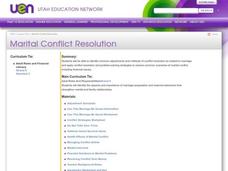Curated OER
Apple Logic and Problem Solving
Learners examine apple production in the United States. For this interdisciplinary lesson, students use problem solving strategies introduced to solve math problems associated with apple production in the United States. Student collect...
Curated OER
The Problem Solving Game
Fifth graders identify the steps to problem solving: STAR (Stop, Think, Act, and Review) and how the steps relate to resolving problems and conflicts. They are told that they are an employee at a game factory. Students are told that they...
Curated OER
Evaluate Problem-Solving in the Context of Culture and Time-frame
Pupils examine literary elements in non-fiction literature. In this problem solving lesson, students read Rosa Parks, My Story and Beyond the Limits. Pupils make oral presentations based on the causes and effects, conflicts, and problem...
Curated OER
Marriage and Financial Goals, Budgeting Strategies
There is no more useful life skill to learn than budgeting and setting financial goals. It's math that is used by every person, everyday. Learners examine the responsibilities and costs involved in family economics. Through a series of...
Curated OER
Be a Problem Solving Star
Third graders observe a math problem and discuss what it is and what they should do with it. They are introduced to the STAR steps for problem solving and discuss how to use it to answer math problems as well as incorporating some of the...
EngageNY
TASC Transition Curriculum: Workshop 8
Lights, camera, action! Math educators consider how to improve their instruction by examining a model of the five-practice problem-solving model involving a movie theater. Participants examine cognitive demand in relation to problem...
Curated OER
Be a Problem Solving Star
Second graders investigate the skill of solving problems. They have class discussion about problem solving and identify the steps in settling conflicts. The strategies are demonstrated for application to problem situations and student...
Curated OER
The Sum of Our Integer Intelligences
Young mathematicians explore integers. They review adding integers through engaging in mathematical labs. Each lab station is designed to reflect one of the multiple intelligences. Resources for all activities are provided.
WE Charity
High School–Module 5: Transportation Solutions
Planes, trains, and automobiles ... the abundance of today's transportation options comes at a hefty price. Using the fifth and final lesson plan from the WE Are Innovators—High School Modules set, pupils explore how modern...
WE Charity
High School–Module 1: Sustainable Innovation
What does it mean to have an innovative mindset? Pupils think outside the box with the first of five lessons from the WE Are Innovators—High School Modules set. Scholars read articles and watch videos about sustainable innovation, such...
US Institute of Peace
Identifying Conflict Styles
Are you a peace-keeper or a problem-solver? Explore conflict management styles through a lesson, fourth in a 15-part series, that combines individual assessment and collaborative work. Groups learn the basic tendencies of each style,...
Curated OER
Getting Ready to Become An Adult
Students participate in a problem solving activity and discuss how effective their solution was. In this getting ready to become an adult lesson, students read Ta-ne-e-ka and use guiding questions to address the relationships in...
Learning for Justice
Marian Wright Edelman
Marian Wright Edelman's 2014 Commencement Speech at Lewis and Clark College serves to inspire young scholars to investigate a problem in their community, to determine why the problem is important, and then to develop a plan for one thing...
ABCya
Civiballs Christmas
For the holiday season, timing is everything—and a Civiballs game is no exception! Learners use strategy, timing, and a little bit of computer-generated luck to solve each level of a game in which they cut chains to release ornaments...
Curated OER
Community Problem Solving
Students use community problem solving to solve a littering problem in the community of San Carlos. Students use a Role Play Description to learn this process.
iCivics
Step Seven: Brainstorm A-Brewin'
Brainstorming—the art of coming up with endless ideas. Pupils brainstorm how to solve local problems in their counties and eventually narrow their ideas down to one solution as a team.
iCivics
Step Eight: Positions, Please!
Everyone sees the results of public policy, but not everyone understands the strategy that goes into creating an effective one. Now that your class understands the brainstorming process from earlier in the series, they continue on to the...
iCivics
Step Nine: Action Campaign
It's time to take action! Learners strategize their action campaigns by using the resource and past brainstorming activities from the series that help them pinpoint problems in their communities. They use included templates to get the...
Curated OER
Calm in the Classroom
Students explore conflict resolution. In this character development lesson, students decorate paper plates to use as puppets. Students role play scenarios in which classroom problem solving is practiced.
Curated OER
Marital Conflict Resolution
While not everybody will end up married, everybody does need to know how to resolve conflict. Learners examine several real-life scenarios involving a married couple. They use problem-solving strategies to help the couple come to an...
New York State Education Department
TASC Transition Curriculum: Workshop 7
Designed specifically for math instructors, the seventh workshop of a 15-part series allows time to explore Webb's DOK, ponder open-ended questions, and create lessons to apply what is learned. Teachers craft high-quality math problems...
Franklin D. Roosevelt Presidential Library & Museum
Role Playing Relating to Big Decisions
While most high schoolers are too young to vote, they still need to learn the skills needed to solve problems. The ninth resource in a 10-part civics series presents class members with four "What Would You Do?" scenarios that have them...
iCivics
Step 4: Consider the Context
Have you ever noticed how deep the roots of a tree or plant stretch? Scholars analyze the context of an issue and the root causes that go to the base of the problem. The fourth step of a 10-part County Solutions - High School unit shares...
WE Charity
Elementary–Module 1: Sustainable Innovation
Where would society be without the innovations of Thomas Edison or Steve Jobs? Scholars explore what it means to have an innovative mindset. Working in small groups, pupils design a product or service to help solve a social,...























